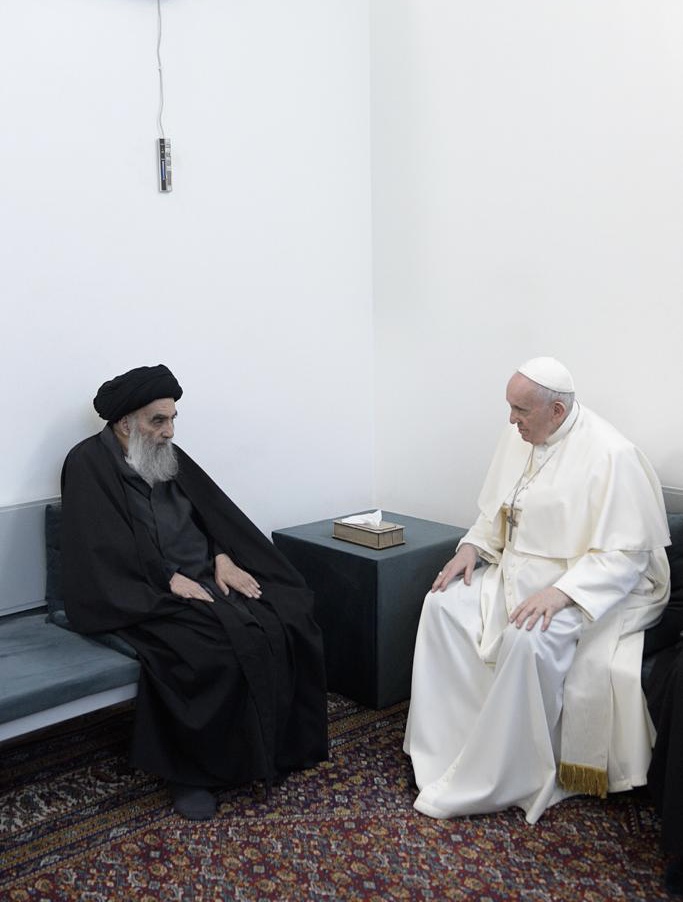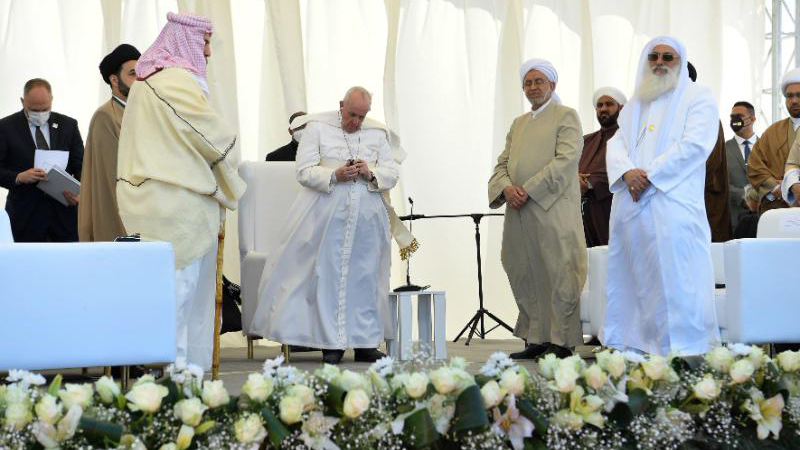On his second day of his visit to Iraq, Pope Francis has strengthened ties of friendship with the Shiite Muslim community, to which around 60 percent of Iraq's population belongs.
Iraqi Christians had requested a meeting, and the Pope's courtesy visit took place in the simple home of Grand Ayatollah Al-Sistani, leader of the Shiite community, in Najad, the third holy city for Shiite Muslims, after Mecca and Medina.
Shunning protocol, this time it was the Ayatollah's own son, Mohammed Rida, who stood at the door to greet the Pope and escort her to her father.
The conversation lasted 45 minutes, longer than initially planned, and in it the Holy Father highlighted "the importance of collaboration and friendship among religious communities so that, by cultivating mutual respect and dialogue, they may contribute to the good of Iraq, the region and all humanity." said Vatican spokesman Matteo Bruni.
The Pope thanked in the visit that, "together with the Shiite community and in the face of the violence and great difficulties of recent years."Grand Ayatollah Al Sistani]. "has raised his voice in defense of the weakest and most persecuted, affirming the sacredness of human life and the importance of the unity of the Iraqi people."
Among the weakest and most persecuted have undoubtedly been the Christians, which has led the Pope to refer to them as "a martyred Church". In bidding farewell to the great Ayatollah, the Holy Father "He reiterated his prayer to God, the Creator of all, for a future of peace and brotherhood for the beloved land of Iraq, for the Middle East and for the whole world".
With Shiites and Sunnis
Shiite Islam accounts for around 15 percent of Muslims worldwide, with a majority in Iran, Iraq itself and southern Lebanon, among other countries; there are also Shiite minorities in Syria, Afghanistan and Pakistan. Sunnis account for around 85 percent of the total and are found, for example, in Saudi Arabia, where the monarchy is Sunni.

Shahrazad Houshmand, Iranian, the first Muslim woman to graduate in Christian Fundamental Theology, has described the figure of Ayatollah Al-Sistani, as "the main religious, theological and legal reference point for Muslims in Iraq and other countries. It covers this role also for the Shiites of Pakistan, India, the Persian Gulf and also for the Shiites of Europe and America.".
In addition, in an interview with Vatican NewsHe recalled that after the meeting in 2019 with the Grand Imam of Al-Azhar Ahmad Al-Tayyib, and the signature of the "Document on Human Fraternity for World Peace and Coexistence", which has been a breakthrough in relations with Sunni Islam, "the meeting with Al-Sistani is a new big step in the dialogue with Islam.".
The first sentence of that document of February 4, 2019, signed in Abu Dhabi, "is precisely the summary of the religious act: the believer and his faith should lead to love and support his neighbor, but it is a love that also becomes support, especially towards those most in need. I believe that this other meeting with Ayatollah Al Sistani is along exactly the same lines."adds Housmand.
"Terrorism abuses religion."
Following his meeting with Al Sistani, Pope Francis held another historic meeting, in Abraham's ancient hometown of Ur of the Chaldees, with representatives of Jews and Muslims, and urged them to walk a path of peace. Some participants offered their testimonies of fraternity, mutual support and hope.
Yesterday, during his meeting with the Catholic community, as reported by this portal OmnesThe Pope had told them: "Tomorrow, in Ur, I will meet the leaders of the religious traditions present in this country, to proclaim once again our conviction that religion must serve the cause of peace and unity among all God's children.".
And indeed, after the testimonies, almost in his first words, Francis pointed out in Ur: "From this place that is the source of faith, from the land of our father Abraham, we affirm that God is merciful and that the most blasphemous offense is to profane his name by hating one's brother. Hostility, extremism and violence are not born of a religious spirit; they are betrayals of religion".
"And we believers cannot remain silent when terrorism abuses religion. Indeed, it is up to us to resolve misunderstandings with clarity. Let us not allow the light of Heaven to be obscured by the clouds of hatred. The dark clouds of terrorism, war and violence have descended on this country. All ethnic and religious communities suffered".
There are still kidnapped and missing persons
The Holy Father then remembered the Yazidi community, "which has mourned the death of many men and has seen thousands of women, youth and children abducted, sold into slavery and subjected to physical violence and forced conversions.
"Today we pray for all those who have endured such suffering and for those who are still missing and kidnapped." added Pope Francis, "that they may soon return to their homes. And we pray that everywhere freedom of conscience and religious freedom may be respected; these are fundamental rights, because they make man free to contemplate the Heaven for which he was created".
The Pope structured his speech in two parts: "We look to the sky." y "We walk on the land." and he had begun his remarks by delving into the "blessed place" of Ur, which "It takes us back to the origins, to the sources of God's work, to the birth of our religions. Here, where our father Abraham lived, we seem to return home. Here he heard God's call, from here he set out on a journey that was to change history. We are the fruit of that call and that journey"..
"And today we, Jews, Christians and Muslims, together with brothers and sisters of other religions." added the Vicar of Christ, "we honor father Abraham in the same way he did: we look to heaven and walk on the earth".
Daewood and Hasan, Christian and Muslim
All the testimonies offered at the Meeting were moving. The Pope referred to some of them. For example, he said, "I was struck by the testimony of Dawood and Hasan, a Christian and a Muslim who, without being discouraged by their differences, studied and worked together. Together they built the future and found themselves brothers. We too, in order to move forward, need to do something good and concrete together. This is the way forward, especially for young people, who cannot see their dreams destroyed by the conflicts of the past".
Najy saved his Muslim neighbor
"Mrs. Rafah told us about the heroic example of Najy, from the Sabean Mandaean community, who lost his life trying to save the family of his Muslim neighbor. How many people here, in the silence and indifference of the world, have embarked on paths of fraternity!!!", the Pope exclaimed.
Rafah also recounted the indescribable sufferings of the war, the Holy Father continued, which has forced many to leave home and homeland in search of a future for their children. "Thank you, Rafah, for having shared with us the firm will to remain here, in the land of your fathers. May those who did not make it and had to flee find a benevolent welcome, worthy of vulnerable and wounded people." added the Pope.
The Roman Pontiff also quoted "the young Muslim volunteers in Mosul, who helped rebuild churches and monasteries, building fraternal friendships on the rubble of hatred, and Christians and Muslims who today are restoring mosques and churches together."and Professor Ali Thajeewho told us about the return of pilgrims to this city".
"It is important to go on pilgrimage to the sacred places; it is the most beautiful sign of the longing for Heaven on earth. Therefore, to love and protect the sacred places is an existential necessity, remembering our father Abraham, who in various places raised altars to the Lord towards heaven".
The Vicar of Christ highlighted the final words of his address in UrWe want to commit ourselves so that God's dream may come true: that the human family may be hospitable and welcoming to all its children and that, gazing at the same sky, it may walk in peace on the same earth.









